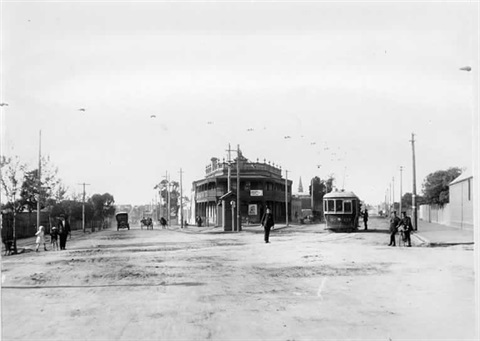Junction Hotel (1859- )

The first mention of the Junction Hotel is in September 1859 that a Dr. Greeves would address electors at Plummer's Junction Hotel. Edmund Sheldrake Plummer [1813-1878]was an experienced publican having previously been based at the Preston Arms Hotel, a premise he sold in late 1858.
In December 1859 a saddle and bridle was stolen from Plummer valued at 30 shillings. The thief, Daniel Lysaght unwisely tried to sell it to Plummer's son John. Lysaught's mistake cost him three months hard labour.
By March 1860 Plummer was in financial trouble and was forced by his creditors, Edwin Ware, John Smith and George Kirk, to put the Junction Hotel up for sale. As well as the hotel, all Plummer's personal estate and effects were also turned over to his creditors.
James Pellatt now established himself at the hotel, advertising in the Argus in December 1860 that he had just opened the Junction Hotel and, 'hoped, by civility and attention to his patrons, to receive the support he has hither been favoured with.'
Pellatt had recently moved from the Yorkshire Stingo Hotel in Collingwood. As he claimed to have recently opened the hotel it implies that the hotel may have been temporarily shut after Plummer's bankruptcy. Less than a year later the license passed to James Douglas Anderson. In April 1864 James's son was born at the hotel.
Edward Poole became the Junction Hotel’s next publican in 1864. In April 1872 Poole fell down a cellar and this may have prompted his decision to sell the lease of the hotel in January 1873. The hotel was offered with horse, coaches and contracts but clearly did not sell as Poole was to remain the publican there until 1877.
Poole was replaced by Frederick Stewart in 1879. Stewart was a professional publican, having already operated the New York Hotel in Melbourne. He was there for four years, raising his family before passing the license on to Thomas Harris in 1883. Harris moved onto the Council Club Hotel in 1889.
In April 1889 Elizabeth Butler became the Junction Hotel’s fifth publican. Born in Greensborough, Butler soon married John Ralph and the pair ran the hotel until John’s death in 1912.
The Depression of the 1890s was beginning to bite in the district and this may have prompted John Ralph to briefly travel to the Coolgardie goldfields of Western Australia in 1894. The Northcote Leader reported that Ralph returned with “…some gold, also – a fine beard.”
The hotel was rebuilt in 1893, with ornate wrought iron around the two story part of the building. Single storey extensions at the rear of the building gave the hotel a distinctive V shape. On the Plenty Road side of the hotel a large room at the rear of the building was utilized for both Council meetings and as a court room. It is likely that inquests were also held here as it was common practice for inquests to be held in local pubs.
In 1914 Elizabeth’s daughter Ada briefly held the license before passing onto another relative, Harry (or Henry) Walker. During this time Elizabeth relocated to Hawthorn with her family. In August 1920 Elizabeth Ralph returned to the Junction Hotel and resumed as landlord, a position she held until her death in 1929.
In 1926/7 the Junction Hotel was demolished and rebuilt for a second time. The old hotel had proved poorly designed and a new art deco style hotel rose in its place. During the rebuilding a temporary bar was established in the paddocks behind the hotel and continued to serve drinks.
After Elizabeth’s death in 1929 her son Thomas became the new publican. He was joined by his sister Ada, her husband and family. Tom Ralph was to remain the publican at the Junction Hotel until his death in 1952. Tom was an avid sports lover and had strong links with the Preston Football Club and the horseracing fraternity.
Elizabeth Ralph’s daughter Ada was to run the hotel from 1952 through to 1959 when C. S. Kirkland became the new publican. R. Moffatt, a grandson of Elizabeth Ralph was the next publican, lasting until 1969. It was about this time that the Ralph connection with the Junction Hotel finally ceased. Over the years the hotel has continued to change and adapt to new circumstances.
A large bistro and gambling lounge has replaced the court room, dining rooms and telephone room, a bottle shop was added in the 1960s and in 2007 smoking areas were created outside as the hotel reacted to changes in the legislation regarding smoking in public places.
Cole, Robert K. Index of Hotels 1841 – 1949. Unpublished manuscript.
Edge, Gary (2004). Surviving the six o’clock swill: a history of Darebin’s hotels. Melbourne: Darebin Libraries.
Minney, Kathleen (1997). Memories of the old Junction Hotel. Unpublished manuscript.
Preston Historical Society (1971). Centenary of local government in Preston: 1871 – 1971: a pictorial record with a brief review of Prestons’ progress and achievements. Preston, Vic: City of Preston.
junctionhotel.pdf(PDF, 10KB)
lhrn2000.pdf(PDF, 20KB)